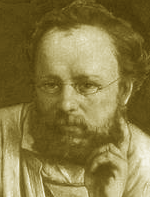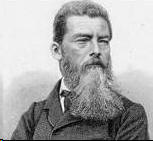Classical humanism, and its impasse of the 20th century.
Here is a brief
but instructive example of historical accident. Before being reduced to a catch-all
and blurred concept, the said classical western humanism was a cultural movement developed in the 19th
and in 20th centuries, on the basis of european philosophers'
works of the 18th century and of the 19th
century, partly supported by references to antique Greco-Roman thinkers, and
to thinkers of the Renaissance (who did not designate themselves yet as
humanists).
 But
in spite of the quality of these sources,
this movement quickly revealed weaknesses, in particular because of the
oppositions and of the contradictory positions of several of its main initiators. In 1846,
for example, P.J. Proudhon used politically the term humanism as "doctrine which takes for
finality the human person", while opposing the fact that some new
humanists tended to deify the human species, but he got lost in controversies of detail, in particular
against Ludwig Feuerbach who saw in humanism a religion of the future, thus more than a simple doctrine.
Ernest Renan, in his Thoughts of 1848-1890, also confirmed his "conviction that the religion of the future will be a pure humanism".
But
in spite of the quality of these sources,
this movement quickly revealed weaknesses, in particular because of the
oppositions and of the contradictory positions of several of its main initiators. In 1846,
for example, P.J. Proudhon used politically the term humanism as "doctrine which takes for
finality the human person", while opposing the fact that some new
humanists tended to deify the human species, but he got lost in controversies of detail, in particular
against Ludwig Feuerbach who saw in humanism a religion of the future, thus more than a simple doctrine.
Ernest Renan, in his Thoughts of 1848-1890, also confirmed his "conviction that the religion of the future will be a pure humanism".
 Later contributions of personalism and existentialism did
not limit the dilution of the public image of what was globally claimed as
humanism, nor its ambiguities regarding religiosity. Moreover, the philosophical approach of the human fact and of the human Being had been often
biased, or contradictory, in the 18th century and during the French Revolution (1789), especially among the encyclopaedists, Voltaire and Beccaria being for example particularly contested, and accused of utilitarian hypocrisy.
Later contributions of personalism and existentialism did
not limit the dilution of the public image of what was globally claimed as
humanism, nor its ambiguities regarding religiosity. Moreover, the philosophical approach of the human fact and of the human Being had been often
biased, or contradictory, in the 18th century and during the French Revolution (1789), especially among the encyclopaedists, Voltaire and Beccaria being for example particularly contested, and accused of utilitarian hypocrisy.
Still, other multiple
pichrocolin oppositions damaged the conceptual coherence of contributors
who did not take enough into account the deep evolutionary way and the
trajectory of historical humanism, in spite of their references to some ancient thinkers.
Was missing a sufficient relation in the human general interest, and in the
prospective development of the species. And its main contributors, almost
exclusively male, reasoned according to western cultural schemes,
incompatible with those of other great cultures.
This movement remained weakened
by its too vague outlines and contents ; Emile Littré, creator of a famous eponym dictionary, defined it in 1874 as a "philosophic theory which connects the historical development of humanity
with humanity itself ". Other definitions pertained as well to
truism or tautology. In the 20th century, the
weaknesses of this movement became more marked instead of being resolved, in
particular because of a
coherence lain insufficient among its
contributors, but as well of serious futuro-technologist aberrations (mainly
transhumanists), and of an excessive centering on the human Being and the human
person (with an ambiguous christian personalism), without balanced and organized reciprocity with the human
evolutionary whole.
In these conditions, incomprehensions, then drifts and abuses, followed one another, until this non-cohesive and
imprecise humanism was finally instrumented by manipulator lobbies to produce
a socially destructuring exemplarity, hidden in a politically-correct mixing
of hypocritical rights-of-man-ism and secularism, leading to worrisome
cognitive dissonances in the public opinion. The humanist qualifier tending to be applied to everything and to its opposite, many inconsistent and contradictory forms of humanism proliferated, in all the senses and in all the recesses of the disturbed thought of the time, until the term
"humanist" no longer means anything comprehensible to the vast majority of people,
at the opposite of the structuring and self-correcting consistency of the historical humanist cultural heritage.
A healthy resumption of
the transmission of this great heritage was fortunately realized
since the 1970s by the cohesive modern current of
eco-humanism, structurally held shielded from impostures, misappropriations,
and aberrations, and reintegrating -in particular through ecology- an
indispensable complementary scientific dimension. In this way, eco-humanism has been able to successfully relay a particularly coherent and reliable trajectory and content of the
essential humanist historical conceptual background, away from the temporary Western deviations.
back
to main page

www.marc-carl.net